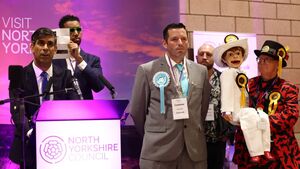UK pays a heavy price for Tories misconduct

Independent candidate Niko Omilana (back) holds an 'L' behind outgoing Prime Minister Rishi Sunak as he delivers a speech next to Reform UK candidate Lee Martin Taylor, Yorkshire Party candidate Rio Goldhammer and Sir Archibald Stanton of The Official Monster Raving Loony Party, after retaining his seat as MP for Richmond and Northallerton in last Thursday's UK General Election. Sunak oversaw the Conservative Party's worst defeat in history. Picture: Darren Staples - WPA Pool/Getty Images
Political choices matter. Good government matters. How decisions about the future are made matters. In this era of relentless negativity about politicians and the political process, these are always points worth making, and events in the UK over the last few days has brought them into even sharper focus. Many of us have been looking back on the fourteen years of Tory government from 2010-24, and a recent book about that time –The Conservative Effect, 2010-2024: 14 Wasted Years? – was reviewed a little while back in .
It is well worth a read, as a tale of what happens when you get bad government. When you don’t follow the evidence; when you get changes in policy at a moment’s notice; when you get one politician after another holding the same ministerial office in quick succession; when reforms announced are soon abandoned; when major issues are ignored and trivial issues highlighted; and above all, when you take wild gambles on ideological hunches and all that matters is holding your own political tribe together, you get what has happened to Britain from 2010-2024.
Now when the Tories came to power in 2010, as part of a coalition government with the Liberal Democrats, Britain certainly had problems, reeling as it was from the effects of the financial crash. They had to get some degree of control over the public finances. But the choices they made went too far, and the consequences are perhaps most starkly illustrated by the NHS, which the British politician Nigel Lawson once said was as close as the English get to having a national religion.
What was once a marvel and a source of enormous pride has spiralled into failure. In 2010, as reported in that piece in last week, 2.5 million people in the UK were waiting for treatment but virtually no one waited for more than six months. By 2023, waiting lists for elective surgery were approaching 8 million with all the knock-on effects on wait times. This is one reason why, despite all the complaints we have about our own health service, any informed commentator will tell you that the NHS in Northern Ireland is no longer an argument against a United Ireland.
How did things get this serious? Since 2010, the UK has had no major rise in the economy and in tax revenues needed to replenish the public services stripped to the bone. Economic productivity and wage growth have stagnated, and it’s hard not to conclude that when they needed to increase their economic output and performance, it would have been wiser not to pick a big fight with their biggest export market.
But of course, as we all know, that’s exactly what they ended up doing. David Cameron won an overall majority for the Tories in the 2015 General Election, and the way he did it led to the UK’s exit from Europe. Divisions about Europe had plagued the Tories and he decided that he would hold his party together by putting a commitment to a referendum on EU membership into his party manifesto. This seemed very clever. He would at once avoid losing votes to Eurosceptic parties and keep his own Eurosceptic party members happy. Do you think the long-term future of the country was much considered?
This wasn’t a new tactic. Harold Wilson had done exactly the same thing in the 1970s. That promise won him power in 1974 but he got lucky when the 1975 referendum on EEC membership was comfortably passed. Wilson was fortunate. Cameron wasn’t. His gamble won him the election and eventually forced him out of office.
If David Cameron’s political demise had been the only price of Brexit, the British might have borne it bravely. Instead, they got an interminable exit from the EU that dragged out for years and delivered almost nothing in the end – and certainly not that infamous £350 million a week more for the NHS so proudly emblazoned on a bus. If ever anything deserved the cliché about all pain and no gain, it is this. Investment levels were impacted, capital spending fell, exports lost. Those factors are felt in the pocket every day, and have created a lot of anger, and a lack of trust. And all those economic problems were bad enough if they didn’t mask another truth: which is that the Tory government continued to peg its major industries to EU standards for fear of making the damage they wrought only worse. Immigration from the rest of the world has sky-rocketed, as immigration from the EU has fallen.
If the damage was just economic, that would have been bad but not the worst. What has been utterly disastrous is that Brexit left the country hopelessly divided, with the young and energetic alienated from their own country. I was at lunch in London some years back where the conversation around the table among a large group was how they might manage to get an EU passport. Can you imagine choosing to create that feeling among your own people? Brexit has weakened the Union, in Scotland, Wales and Northern Ireland. It badly damaged relations with us, and we can only hope that they start to improve now over the coming years.
And the politicians that Brexit enabled, the government of Boris and his parties, and the frankly incredible Premiership of Liz Truss, surely pushed the country into a political Thunderdome. It will pay a price for a long time for that loss of faith in its institutions.
Yes, Brexiteers can say they got the vaccination programme started a few weeks before the rest of Europe. That felt important, then, and of course it’s not the case that absolutely everything is terrible. Britain remains a very impressive country, with a lot going for it. But after 14 years of a government that made bad choices, it has lost income, lost investment, gotten angrier, more divided, less relevant on the international stage, and the choices ahead have only got more difficult. As Gordon Brown pointed out, policy over the last 14 years has created a sense that to be poor had once again become shameful. So just right now they could do with a government that makes good decisions, or at the very least, better ones than those they have experienced over the last 14 years.
So, political choices matter. How a country is governed matters, and of course it’s not just politicians themselves who make those decisions. Politicians and voters are like flowers and sunshine. They respond to the stimulus, and therefore how you vote matters too. As our attention span narrows, as our desire for instant gratification or easy answers grows, so too will grow the desire among politicians to feed us easy answers and avoid hard decisions. Whether that be on pensions, on public spending, on water quality, on the environment, on health care provision, or on what we have to do to respond to a changing and threatening world, we can certainly try what Britain tried and swallow a lot of pretty fictions that eventually turn sour.
Or perhaps we can choose to learn the lessons of their recent history and avoid those wasted years their new government now has to try and recover from. It’s in all our interests that we do.





